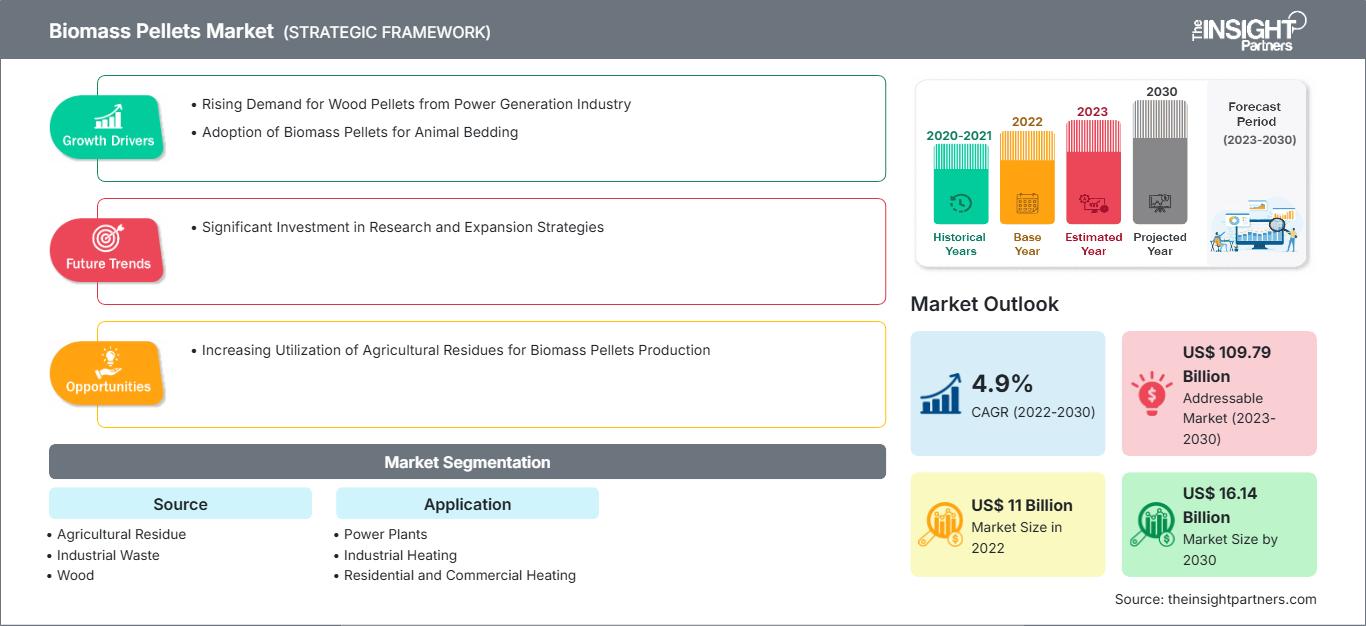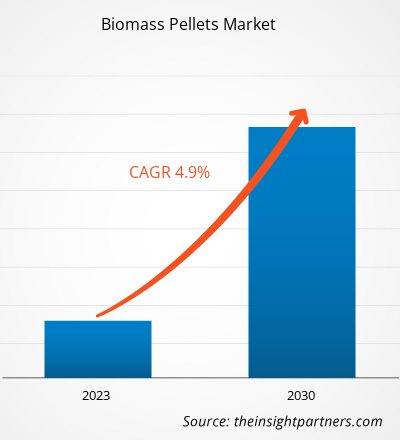[研究报告] 2022年,生物质颗粒市场规模为110.0159亿美元,预计到2030年将达到161.3789亿美元;预计2022年至2030年的复合年增长率为4.9%。
市场洞察与分析师观点:
生物质颗粒是经过加工的高密度生物质,被压缩成小圆柱形。它来源于有机材料,例如农业残留物、木材废料、木屑、锯末和森林残留物。生物质颗粒用于住宅、商业和工业领域的发电和供暖。与未加工的生物质相比,它具有许多优势,例如标准化特性、高能量含量、易于储存和易于运输。生物质颗粒,即木质颗粒,广泛用于住宅颗粒炉和锅炉。政府致力于减少温室气体排放并推广生物质颗粒的利用,这推动了生物质颗粒市场的增长。
增长动力与挑战:
随着人们对可持续发展的日益关注,对木质颗粒等生物质颗粒的需求显著增长。木质颗粒可作为煤炭原料的替代品用于发电。此外,生物质颗粒形状均匀、密度高,易于运输和储存。发电应用对木质颗粒的需求大幅增长。在欧洲、北美以及中国、日本和韩国等亚洲国家,木质颗粒主要用于燃煤电厂的混烧。全球大型发电厂对煤炭替代材料的使用正在增加。 2021 年,印度电力部规定,所有燃煤发电厂的煤炭燃料混合中生物质颗粒的使用率至少应为 5%。此类规定正在推动印度生物质颗粒市场的增长。此外,根据美国农业部的数据,荷兰和比利时等几个欧洲国家的大型电力公司从美国、俄罗斯和加拿大采购生物质颗粒。因此,发电行业对木质颗粒的需求不断增长,推动了生物质颗粒市场的发展。生物质颗粒来源于木材、农业残留物和工业废料等有机材料。许多国家将生物质颗粒视为可持续燃料来源;然而,生物质颗粒存在一些环境问题。生物质颗粒的燃烧会向空气中释放污染物,包括颗粒物、氮氧化物和挥发性有机化合物。此外,生物质的生产需要消耗大量的水来进行加工。因此,与生物质颗粒相关的环境问题正在阻碍生物质颗粒市场的增长。
自定义此报告以满足您的要求
您将免费获得任何报告的定制,包括本报告的部分内容,或国家级分析、Excel 数据包,以及为初创企业和大学提供超值优惠和折扣
生物质颗粒市场: 战略洞察

- 获取本报告的主要市场趋势。这个免费样本将包括数据分析,从市场趋势到估计和预测。
您将免费获得任何报告的定制,包括本报告的部分内容,或国家级分析、Excel 数据包,以及为初创企业和大学提供超值优惠和折扣
生物质颗粒市场: 战略洞察

- 获取本报告的主要市场趋势。这个免费样本将包括数据分析,从市场趋势到估计和预测。
报告细分和范围:
全球生物质颗粒市场根据来源、应用和地域进行细分。根据来源,生物质颗粒市场细分为农业残留物、工业废料、木材等。根据应用,生物质颗粒市场细分为发电厂、工业供暖、住宅和商业供暖等。按地域划分,生物质颗粒市场细分为北美(美国、加拿大和墨西哥)、欧洲(德国、法国、意大利、英国、俄罗斯和欧洲其他地区)、亚太地区(澳大利亚、中国、日本、印度、韩国和亚太其他地区)、中东和非洲(南非、沙特阿拉伯、阿联酋和中东和非洲其他地区)以及南非和中美洲(巴西、阿根廷以及南美洲和中美洲其他地区)
细分分析:
根据来源,生物质颗粒市场分为农业废弃物、工业废料、木材和其他。木材部分在生物质颗粒市场中占有最大份额,预计在预测期内将实现显着增长。生物质颗粒是利用木材废料制成的,例如锯末、木屑、刨花、树皮以及木工、锯木厂和木材加工产生的其他残余材料。木材废料经过收集、加工、干燥和制粒。木质生物质颗粒广泛用于住宅供暖、工业炉和发电厂。
区域分析:
根据地理位置,生物质颗粒市场分为五个主要区域——北美、欧洲、亚太地区、南美和加勒比地区。中美洲、中东和非洲。全球生物质颗粒市场以欧洲为主,2022 年欧洲的市场规模约为 64.78 亿美元。亚太地区是第二大市场,同年占全球生物质颗粒市场份额的 30% 以上。预计北美在预测期内的复合年增长率将超过 4.5%。在北美,与家用取暖油和丙烷相比,生物质颗粒市场在很大程度上受到生物质颗粒区域成本竞争力的驱动。由于海外市场需求不断增长,北美木质颗粒的生产在过去几年中获得了发展动力。根据美国农业部的数据,美国和加拿大向荷兰和比利时的发电厂供应木质颗粒。该地区国内对生物质颗粒的需求增加促使制造商扩大生产能力。 2023年,加拿大Grand River Pellets公司投资3000万美元,将生物质颗粒产能从每年14万吨扩大到22万吨。所有这些因素都在推动北美生物质颗粒市场的增长。
行业发展和未来机遇:
生物质颗粒市场主要参与者采取的各种举措如下:
- 2022年9月,Enviva Inc在美国密西西比州乔治县启用了其新建的木质颗粒制造工厂。该工厂于2022年初投入生产,年产能达到75万吨(MTPY)。
- 2022年4月,Drax Group PLC在美国阿拉巴马州迪莫波利斯开设了一家新的颗粒工厂。该工厂每年利用锯木厂的锯末、木片和刨花等残渣生产可持续生物质颗粒。
- 2020年12月,Pure Biofuel Ltd.推出了ENPOWER木质颗粒。ENPOWER木质颗粒包装袋符合英国颗粒委员会和欧洲理事会制定的A1质量标准。该产品有 10 公斤或 15 公斤两种包装规格。
- 2021 年 4 月,Drax Group PLC 收购了 Pinnacle Renewable Energy Inc.。通过此次收购,Drax Group PLC 实现了生物能源与碳捕获和储存 (BECCS) 的结合,每年可永久性地从大气中去除二氧化碳。
- 2023 年 5 月,LEAG 集团通过竞标从私募股权投资者 Metropolitan Equity Partners 手中收购了 Wismar Pellets GmbH,以扩大其炼油业务的生产和供应组合。此次收购将有助于 LEAG 集团服务更多客户。
生物质颗粒市场
The Insight Partners 的分析师已详尽阐述了预测期内影响生物质颗粒市场的区域趋势和因素。本节还讨论了北美、欧洲、亚太地区、中东和非洲以及南美和中美洲的生物质颗粒市场细分和地域分布。
生物质颗粒市场报告范围
| 报告属性 | 细节 |
|---|---|
| 市场规模 2022 | US$ 11 Billion |
| 市场规模 2030 | US$ 16.14 Billion |
| 全球复合年增长率 (2022 - 2030) | 4.9% |
| 历史数据 | 2020-2021 |
| 预测期 | 2023-2030 |
| 涵盖的领域 |
By 来源
|
| 覆盖地区和国家 | 北美
|
| 市场领导者和主要公司简介 |
|
生物质颗粒市场参与者密度:了解其对业务动态的影响
生物质颗粒市场正在快速增长,这得益于终端用户需求的不断增长,而这些需求的驱动因素包括消费者偏好的转变、技术进步以及对产品优势的认知度的提升。随着需求的增长,企业正在扩展产品线,不断创新以满足消费者需求,并抓住新兴趋势,从而进一步推动市场增长。

- 获取 生物质颗粒市场 主要参与者概述
COVID-19 影响:
COVID-19 疫情影响了各国几乎所有行业。北美、欧洲、亚太地区 (APAC)、南美和中美以及中东和非洲 (MEA) 的封锁、旅行限制和企业停工阻碍了多个行业的增长,包括化学和材料行业。生物质颗粒公司生产部门的关闭扰乱了全球供应链、生产活动和交付计划。2020 年,各公司都经历了产品交付延迟和产品销量暴跌。疫情期间,大多数发电厂和工厂关闭,减少了生物质颗粒的消费。此外,疫情导致生物质颗粒价格波动。不过,在供应限制得到解决后,各行业都恢复了运营。此外,工业和住宅部门对生物质颗粒的需求不断增长,极大地促进了生物质颗粒市场的增长。
竞争格局和关键公司:
全球生物质颗粒市场的一些参与者包括 Drax Group Plc、Enviva Inc、AS Graanul Invest、Lignetics Inc、Valfei Products Inc、Mallard Creek Inc、Energex American Inc.、Wismar Pellets GmbH、UAB Redal Ltd 和 Premium Pellet Ltd。在全球生物质颗粒市场运营的参与者专注于提供高质量的产品以满足客户需求。
- 历史分析(2 年)、基准年、预测(7 年)及复合年增长率
- PEST和SWOT分析
- 市场规模、价值/数量 - 全球、区域、国家
- 行业和竞争格局
- Excel 数据集
近期报告
相关报告
客户评价
购买理由
- 明智的决策
- 了解市场动态
- 竞争分析
- 客户洞察
- 市场预测
- 风险规避
- 战略规划
- 投资论证
- 识别新兴市场
- 优化营销策略
- 提升运营效率
- 顺应监管趋势




















 获取免费样品 - 生物质颗粒市场
获取免费样品 - 生物质颗粒市场